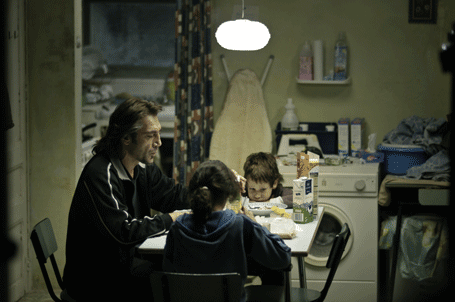
The writer-director team of Guilermo Arriaga and Alejandro González Iñárritu broke up in 2006 after the critical failure that was Babel, and Iñárritu hasn’t looked back since. Good for him – in abandoning his artistic partner, Iñárritu has outgrown his penchant for the sterile portmanteau film form.
In Biutiful, the director comes close to the initial promise and artistry displayed in his breakout Amores Perros. In this drama, Javier Bardem plays Uxbal, a man down on his luck, living in a crapsack Barcelona that resembles the dumps of the third world. He sees dead people but no one takes his talent seriously though he is in demand for folk rituals. As a middleman in a corrupt system, he derives no profit from taking kickbacks from a pair of gay Chinese sweatshop owners who make criminally substandard fashion knockoffs and no comfort or protection by giving bribes to crooked cops. On top of that, he has to deal with a messy divorce, bring up two kids – all while living in some form of abject poverty.
To “top” things off, Uxbal is dying from cancer too. Come in 5 minutes late and you will miss the most depressing opening to a Cannes award-winning film. This film, like Iñárritu’s oeuvre, promises no happy endings. Now that the director tells only one story in a film, this depressing quality is all the more exposed for all to see. But if you are the type to derive some aesthetic pleasure from a well-told sob story, from watching a tragedy where a hero just goes from one depth to another without any hope or chance of bettering his lot – this is some art to look at.
The genius of Biutiful is what strikes you minutes or hours after its viewing. Iñárritu’s relentlessly depressing take on the noir film is so subversive that one may miss it for a radical surgery on the normally romantic genre, while Javier Bardem’s channelling of misery and pathos obscures the fact that his character is essentially a hoodlum, a gangster, an extortionist and worse. Under Iñárritu’s direction, what starts out as a noir is transformed into the world’s saddest flick – and that’s not a bad thing.

